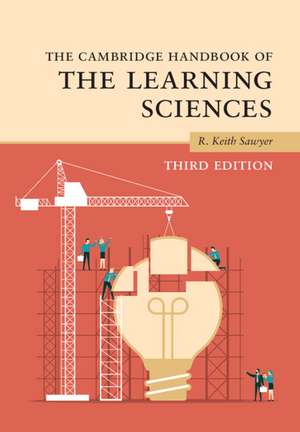The Cambridge Handbook of the Learning Sciences: Cambridge Handbooks in Psychology
Editat de R. Keith Sawyeren Limba Engleză Hardback – 6 apr 2022
| Toate formatele și edițiile | Preț | Express |
|---|---|---|
| Paperback (1) | 420.12 lei 3-5 săpt. | +52.95 lei 4-10 zile |
| Cambridge University Press – 6 apr 2022 | 420.12 lei 3-5 săpt. | +52.95 lei 4-10 zile |
| Hardback (1) | 1085.24 lei 17-23 zile | +104.44 lei 4-10 zile |
| Cambridge University Press – 6 apr 2022 | 1085.24 lei 17-23 zile | +104.44 lei 4-10 zile |
Din seria Cambridge Handbooks in Psychology
-
 Preț: 478.42 lei
Preț: 478.42 lei - 11%
 Preț: 449.49 lei
Preț: 449.49 lei -
 Preț: 494.11 lei
Preț: 494.11 lei - 5%
 Preț: 391.19 lei
Preț: 391.19 lei - 8%
 Preț: 426.60 lei
Preț: 426.60 lei - 8%
 Preț: 424.41 lei
Preț: 424.41 lei - 5%
 Preț: 441.42 lei
Preț: 441.42 lei - 14%
 Preț: 1260.98 lei
Preț: 1260.98 lei -
 Preț: 485.96 lei
Preț: 485.96 lei - 8%
 Preț: 429.69 lei
Preț: 429.69 lei - 9%
 Preț: 594.27 lei
Preț: 594.27 lei - 23%
 Preț: 1225.07 lei
Preț: 1225.07 lei - 23%
 Preț: 1227.70 lei
Preț: 1227.70 lei - 23%
 Preț: 1234.95 lei
Preț: 1234.95 lei - 5%
 Preț: 718.47 lei
Preț: 718.47 lei - 23%
 Preț: 1233.51 lei
Preț: 1233.51 lei - 8%
 Preț: 426.60 lei
Preț: 426.60 lei - 8%
 Preț: 427.05 lei
Preț: 427.05 lei - 8%
 Preț: 425.42 lei
Preț: 425.42 lei -
 Preț: 411.90 lei
Preț: 411.90 lei -
 Preț: 272.34 lei
Preț: 272.34 lei - 8%
 Preț: 425.42 lei
Preț: 425.42 lei -
 Preț: 370.88 lei
Preț: 370.88 lei -
 Preț: 502.65 lei
Preț: 502.65 lei -
 Preț: 374.90 lei
Preț: 374.90 lei - 8%
 Preț: 489.88 lei
Preț: 489.88 lei -
 Preț: 493.56 lei
Preț: 493.56 lei -
 Preț: 495.43 lei
Preț: 495.43 lei -
 Preț: 503.02 lei
Preț: 503.02 lei -
 Preț: 503.02 lei
Preț: 503.02 lei - 5%
 Preț: 1512.86 lei
Preț: 1512.86 lei - 23%
 Preț: 2157.92 lei
Preț: 2157.92 lei - 9%
 Preț: 850.10 lei
Preț: 850.10 lei - 8%
 Preț: 428.36 lei
Preț: 428.36 lei -
 Preț: 480.29 lei
Preț: 480.29 lei - 8%
 Preț: 420.12 lei
Preț: 420.12 lei - 8%
 Preț: 430.05 lei
Preț: 430.05 lei -
 Preț: 489.01 lei
Preț: 489.01 lei -
 Preț: 278.23 lei
Preț: 278.23 lei
Preț: 1085.24 lei
Preț vechi: 1409.40 lei
-23% Nou
Puncte Express: 1628
Preț estimativ în valută:
207.69€ • 216.37$ • 172.68£
207.69€ • 216.37$ • 172.68£
Carte disponibilă
Livrare economică 16-22 ianuarie 25
Livrare express 03-09 ianuarie 25 pentru 114.43 lei
Preluare comenzi: 021 569.72.76
Specificații
ISBN-13: 9781108840989
ISBN-10: 1108840981
Pagini: 744
Dimensiuni: 182 x 259 x 44 mm
Greutate: 1.58 kg
Ediția:3Revizuită
Editura: Cambridge University Press
Colecția Cambridge University Press
Seria Cambridge Handbooks in Psychology
Locul publicării:New York, United States
ISBN-10: 1108840981
Pagini: 744
Dimensiuni: 182 x 259 x 44 mm
Greutate: 1.58 kg
Ediția:3Revizuită
Editura: Cambridge University Press
Colecția Cambridge University Press
Seria Cambridge Handbooks in Psychology
Locul publicării:New York, United States
Cuprins
Preface R. Keith Sawyer; 1. An introduction to the learning sciences R. Keith Sawyer; Part I. Foundations: 2. Foundations of the learning sciences Mitchell J. Nathan, R. Keith Sawyer; 3. Scaffolding Brian J. Reiser, Iris Tabak; 4. Project-based learning Joseph S. Krajcik, Namsoo Shin; 5. Metacognition and self-regulated learning Philip H. Winne, Roger Azevedo; 6. A history of conceptual change research: Threads and fault lines Andrea A. diSessa; 7. Learning in activity Yrjö Engeström; 8. Cognitive apprenticeship Allan Collins, Manu Kapur; Part II. Methodologies: 9. Design-based research: A methodological toolkit for engineering change Sasha Barab; 10. Analyzing collaboration Noel Enyedy, Reed Stevens; 11. Microgenetic methods Bruce L. Sherin, Clark A. Chinn; 12. A learning sciences perspective on the design and use of assessment in education James W. Pellegrino; 13. Learning analytics and educational data mining Ryan S. Baker, George Siemens; Part III. Grounding Technology in the Learning Sciences: 14. Videogames and learning Constance Steinkuehler, Kurt Squire; 15. Embodiment and embodied design Dor Abrahamson, Robb Lindgren; 16. Tangible and Full-body interfaces in learning Narcis Pares, Michael Eisenberg; 17. Augmented reality in the learning sciences Bertrand Schneider, Iulian Radu; 18. Mobile learning Roy Pea, Mike Sharples; Part IV. Learning Together: 19. Knowledge building and knowledge creation Marlene Scardamalia, Carl Bereiter; 20. Computer-supported collaborative learning Gerry Stahl, Timothy Koschmann, Daniel Suthers; 21. Arguing to learn Jerry Andriessen, Michael Baker; 22. Informal learning in museums Palmyre Pierroux, Karen Knutson, Kevin Crowley; Part V. Learning Disciplinary Knowledge: 23. Research in mathematics education: What can it teach us about human learning? Anna Sfard, Paul Cobb; 24. Science education and the learning sciences: A coevolutionary connection Nancy Butler Songer, Yael Kali; 25. Complex systems and the learning sciences: Educational, theoretical, and methodological implications Michael J. Jacobson, Uri Wilensky; 26. Learning history Mario Carretero, Everardo Perez-Majarrez; 27. Learning to be literate Peter Smagorinsky, Richard E. Mayer; 28. Arts education and the learning sciences Erica Halverson, Kimberly Sheridan; 29. Learning as a cultural process: Achieving equity through diversity Na'ilah Suad Nasir, Ann S. Rosebery, Beth Warren, Carol D. Lee; 30. Designing for meaningful learning: Interest, motivation, and engagement K. Ann Renninger, Sanna Järvelä; 31. Advances in teacher learning research in the learning sciences Barry J. Fishman, Carol K. K. Chan, Elizabeth A. Davis; 32. Learning sciences and policy: A decade of mutual engagement William R. Penuel, James P. Spillane, Min Sun; 33. The learning sciences in the 2020s: Implications for schools and beyond R. Keith Sawyer.
Descriere
The definitive introduction to the learning sciences - an interdisciplinary approach to teaching, learning and educational technology.
